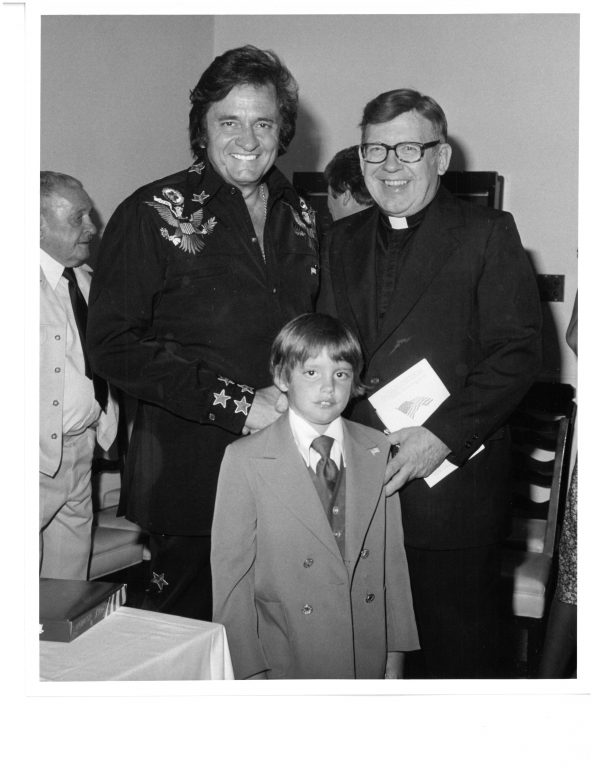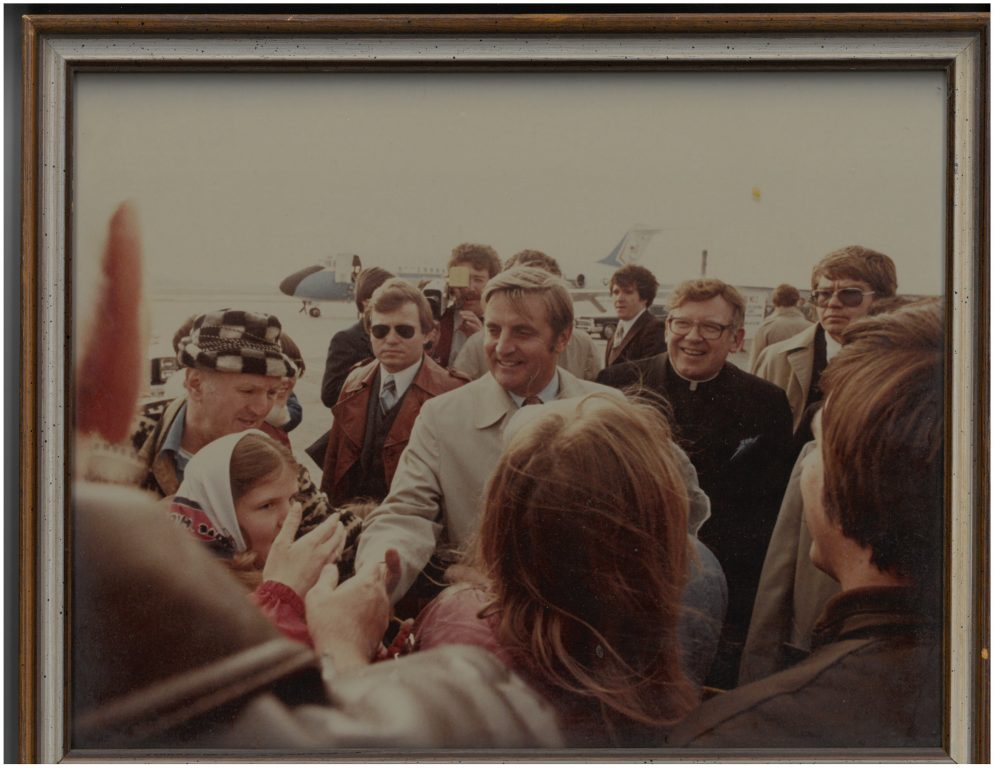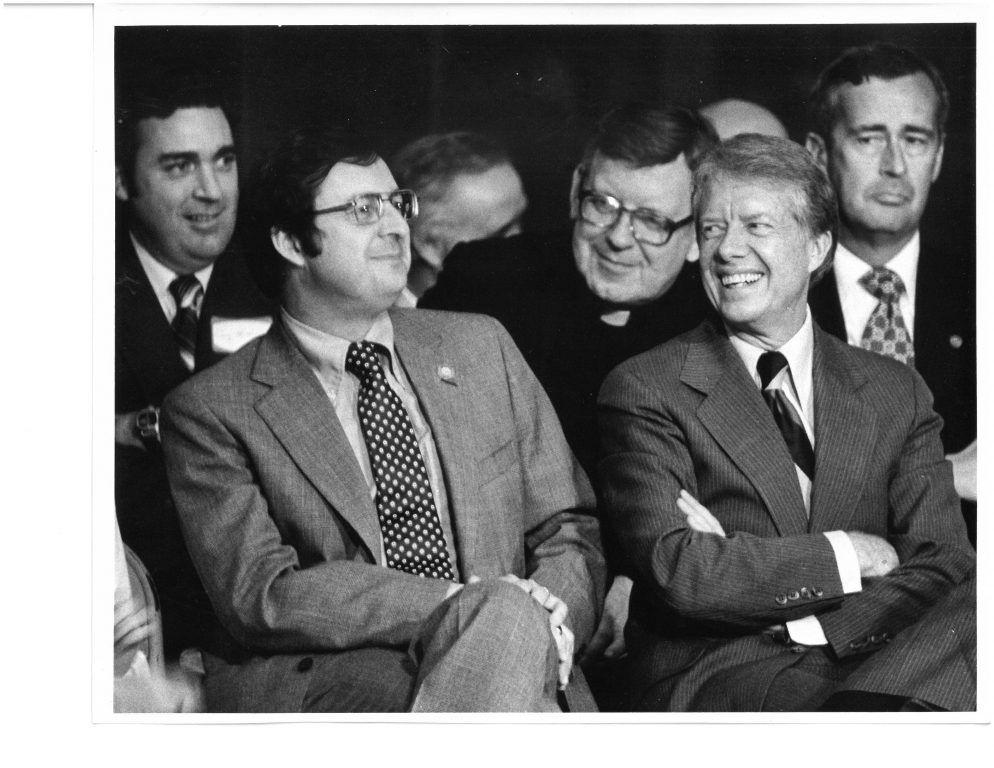Wisconsin’s Congressman Priest
Fr. Robert Cornell loved rock music and served two terms as a Democratic congressman.

Cornell poses with Johnny Cash and an unknown boy. The priest organized concerts in Green Bay in the ’60s and ’70s and hosted the Johnny Cash Show and other well-known performers. Photo courtesy of the St. Norbert Abbey.
In 1976, Catholic priest and Congressman Robert Cornell was running for re-election in his northwestern Wisconsin district when future President Jimmy Carter’s running mate, Walter Mondale, stopped at St. Norbert College in Green Bay to stump for his boss.
Mondale asked Cornell, who taught political science at the college, to introduce the vice-presidential candidate at a campus rally. When the two men stepped on stage, they were greeted by students holding up a large sign.
”The future vice president never let me forget this evidence of my popularity with the student body,” Cornell wrote in his self-published memoir, “Is There A Priest In The House?”
One of only two Catholic priests to serve as a voting member of the U.S. House in its 230-year history, Cornell maintained that playfulness and humility throughout his long teaching career and historic, if short, stint as a Congressman.
A largely-forgotten public figure today, Cornell is a reminder — particularly relevant in the current toxic, dysfunctional political climate — that principled service and congeniality have value.
He displayed those qualities despite fierce criticism that sometimes came from his own party and the slightly mysterious command, ostensibly from the Vatican, that ended his Congressional career.
“Bob was a very principled Democrat,” said David Wegge, a now-retired political science professor who taught with Cornell at St. Norbert. “I know he had friends on the other side of the aisle. I know he appreciated the debate with them over ideological positions. I think he always found the conservatives as being very principled who had a different point of view and look of the world than he did.”
Father Cornell was “a firm believer in compromise,” said LaurieAn Zollar, whose deceased husband Dan played cribbage with the congressman and served as his campaign treasurer.
“He would listen to both sides, said Zollar of De Pere. “He would figure it out. He was a master at that.”
Roses for June
The priest and politician was born in Gladstone, Michigan, near Escanaba, in 1919, according to the Biographical Directory of the United States Congress. He earned his bachelor’s degree from St. Norbert, where he would go on to teach from 1947 until 2001, taking breaks for two terms in Congress.
Before he entered partisan politics, Cornell was perhaps best known in Northeast Wisconsin for organizing concerts. They featured big-name performers like Johnny Cash and June Carter, The Yardbirds, and The Carpenters at the recently-demolished Brown County Arena.
Though the priest cheekily mocks himself as a “lonely celibate” in his memoir, the star performers who came to town got to know him well. Cornell always left roses in the dressing room for June Carter, several of his friends recalled. That gesture prompted the singer to call the Green Bay venue her favorite, Wegge recalled Cornell saying.
Zollar remembered loaning her ironing board to Cornell so Karen Carter could press her costume before the show.
And when Green Bay Packer Forrest Gregg surprised Cornell by campaigning for him at a rally in 1972, the concerts were a critical factor.
“At the time I told him that I would do anything to meet Johnny Cash,” Cornell quotes Gregg in the memoir. “Now I’m paying off.”
Partisan Politics and A Tiff With Tip
Cornell first decided to cannonball into the pool of partisan politics in 1961 after receiving an unfavorable response to a speech he gave to a large group of local Catholic laypeople in Green Bay.
Some of the wealthier audience members were apparently unimpressed by Cornell’s suggestions to ensure greater social justice in the country. The negative reaction “shocked” him, he wrote, because he had based the speech on encyclicals, letters from the pope to all his bishops.
“I decided that speaking or teaching about issues of social justice and human rights would not be sufficient,” he wrote.
He lost again in 1972 in a “relatively close election,” but broke through in 1974 with a wave of other Democrats, part of what became known as the “Watergate Class” that emerged after President Richard Nixon resigned.
In 1976, with Jimmy Carter on the ballot, Cornell squeaked by his Republican challenger to win reelection.
Once in the House, he worked – and tangled – with some of the most powerful people in the country.
He found President Gerald Ford friendlier than President Carter, whom Cornell had not initially supported for president.
He backed longtime Speaker of the House Tip O’Neill, a fellow Democrat, in his first term. But Cornell declined to do so in his second, upset by the speaker’s “old pol” approach and his refusal to take up tough issues important to the freshman class of representatives.
When Cornell tried to land a seat on the powerful Ways and Means Committee, he found himself just short of the votes needed for confirmation.
“Did Tip get his revenge?” Cornell wondered in his memoir.
The speaker “offered help if I needed any,” the priest noted, but not until after he had lost his reelection attempt in 1978.
Cornell sometimes got along better with the opposition better than his own party.
He recalled how Republican House leadership had always been kind to him, allowing him to rent a room in a government building over which they had some control, even declining to campaign against him.
“I guess really nice guys can be wrong on the issues,” he wrote.
Missing out on the Ways and Means Committee, Cornell found himself instead on the Veterans Affairs Committee, where he fought hard for former members of the military, sometimes to the annoyance of other committee members.
In one of his more controversial stances, Cornell cast an unpopular vote on raising the Congressional salary from $42,000 to $54,000 in 1977. The priest argued the increase was appropriate, considering members of Congress hadn’t received a cost of living adjustment since 1969.
One of his more controversial bipartisan forays occurred in 1977, when Cornell supported an amendment which set a subminimum wage for minors. Organized labor, which was a strong supporter of Cornell, opposed the amendment, and it was defeated by the narrowest of margins — after Speaker O’Neill cast a rare vote to break the tie.
“C’est la vie or something!” Cornell wrote.
The priest was uncomfortable with fundraisers in Washington D.C., where lobbyists were asked to give $100 each. Instead he said he preferred events back home where supporters gave $10 and $15 contributions.
But even this Godly man showed some imperfections while walking the halls of power.
At a breakfast with President Ford, he wanted to pocket one of the official White House salt and pepper sets to take home as a souvenir.
“I resisted the temptation,” he wrote.
Beaten at the Ballot Box, then Finished by the Vatican
While “the enlightened electorate” sent him to Washington D.C. in 1974 “to set things straight,” Cornell wrote, “my constituents decided that I had completed my work after four years.”
In 1978, Cornell was beaten badly by Republican state Rep. Toby Roth of Appleton, who outspent the priest about 3-1 and won about 58 percent of the vote. The election was the midterm after President Carter was voted into office, which traditionally leads to losses for the party in power, Cornell noted.
Timothy Hinkfuss, now a Brown County judge, remembers serving as one of many youth footsoldiers in Cornell’s campaigns, knocking on doors to hand out pamphlets and yard signs.
“He took his job very seriously,” Hinkfuss said of Cornell, “and the campaign came second.”
The family, which included Rosemary T. Hinkfuss, a state representative, and Bill Hinkfuss, a Green Bay city councilman, were great friends and supporters of Cornell, but hounded the priest to come back to the district and campaign more frequently.
“In my opinion, he had to give more attention to getting reelected,” Timothy Hinkfuss said. “That’s the only negative I can say, and maybe it’s not even a negative.”
Cornell planned to run again in 1980, but the higher ups in the Catholic Church got involved.
Before campaign season began, Pope John Paul I sent a letter to Father Robert Drinan, a Massachusetts Democrat and the other priest serving in Congress at the time, that he must remove himself from partisan politics.
Confusion ensued in Green Bay. Cornell hadn’t received a letter from the Pope, which prompted the priest’s superiors to try to determine if the Pope’s directive to Drinan applied to Cornell. Eventually a superior decided it did, a judgment Cornell suspected didn’t come directly from the Vatican.
Cornell noted in his memoir that both priests opposed abortion. Drinan, however, always had supported federal funding for the procedure. Cornell consistently voted against that.
Either way, winning back the seat in 1980, with Ronald Reagan at the top of the ballot, would have been “an uphill battle,” Wegge noted.
Cornell settled back into teaching for three decades and retired to the St. Norbert Abbey in 2001. Zollar recalls bringing him cans of franks and beans and beloved chocolate-covered caramels from Seroogy’s, a local candy shop. He passed away in 2009 at the age of 89.
If Cornell were alive today, Wegge said, “he would be quite appalled at the current political climate. In particular, I think he would be quite concerned with President Donald Trump.
“And I think,” Wegge added, “he would be quite concerned with Republican members of Congress not willing to stand up to Trump.”
Cornell never seemed to have that problem.
“He was very idealistic and very ivory tower, if you will,” Timothy Hinkfuss recalled, “and thought everybody should be treated cordially no matter their point of view. Ultimately I think it got him in trouble. If he was a better politician, perhaps he wouldn’t have suffered the defeat that he did.”
Special thanks to Matthew Schleicher, who assisted with this story.
The Rock ‘n Roll Wisconsin Congressman Who Was Benched By The Pope was originally published by The Badger Project.























